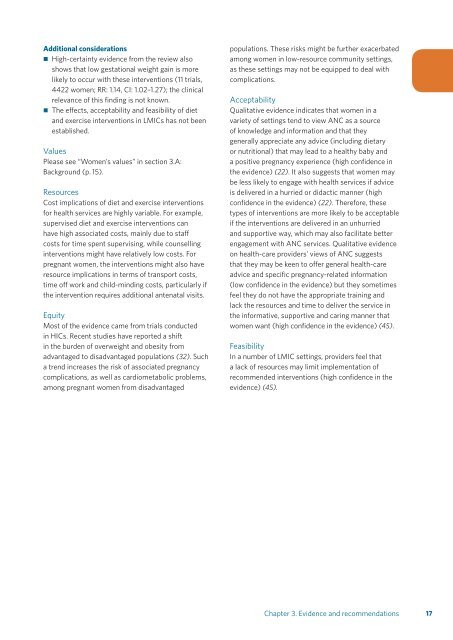WHO recommendations on antenatal care for a positive pregnancy experience
5pAUd5Zhw
5pAUd5Zhw
Create successful ePaper yourself
Turn your PDF publications into a flip-book with our unique Google optimized e-Paper software.
Additi<strong>on</strong>al c<strong>on</strong>siderati<strong>on</strong>s<br />
• nHigh-certainty evidence from the review also<br />
shows that low gestati<strong>on</strong>al weight gain is more<br />
likely to occur with these interventi<strong>on</strong>s (11 trials,<br />
4422 women; RR: 1.14, CI: 1.02–1.27); the clinical<br />
relevance of this finding is not known.<br />
• nThe effects, acceptability and feasibility of diet<br />
and exercise interventi<strong>on</strong>s in LMICs has not been<br />
established.<br />
Values<br />
Please see “Women’s values” in secti<strong>on</strong> 3.A:<br />
Background (p. 15).<br />
Resources<br />
Cost implicati<strong>on</strong>s of diet and exercise interventi<strong>on</strong>s<br />
<strong>for</strong> health services are highly variable. For example,<br />
supervised diet and exercise interventi<strong>on</strong>s can<br />
have high associated costs, mainly due to staff<br />
costs <strong>for</strong> time spent supervising, while counselling<br />
interventi<strong>on</strong>s might have relatively low costs. For<br />
pregnant women, the interventi<strong>on</strong>s might also have<br />
resource implicati<strong>on</strong>s in terms of transport costs,<br />
time off work and child-minding costs, particularly if<br />
the interventi<strong>on</strong> requires additi<strong>on</strong>al <strong>antenatal</strong> visits.<br />
Equity<br />
Most of the evidence came from trials c<strong>on</strong>ducted<br />
in HICs. Recent studies have reported a shift<br />
in the burden of overweight and obesity from<br />
advantaged to disadvantaged populati<strong>on</strong>s (32). Such<br />
a trend increases the risk of associated <strong>pregnancy</strong><br />
complicati<strong>on</strong>s, as well as cardiometabolic problems,<br />
am<strong>on</strong>g pregnant women from disadvantaged<br />
populati<strong>on</strong>s. These risks might be further exacerbated<br />
am<strong>on</strong>g women in low-resource community settings,<br />
as these settings may not be equipped to deal with<br />
complicati<strong>on</strong>s.<br />
Acceptability<br />
Qualitative evidence indicates that women in a<br />
variety of settings tend to view ANC as a source<br />
of knowledge and in<strong>for</strong>mati<strong>on</strong> and that they<br />
generally appreciate any advice (including dietary<br />
or nutriti<strong>on</strong>al) that may lead to a healthy baby and<br />
a <strong>positive</strong> <strong>pregnancy</strong> <strong>experience</strong> (high c<strong>on</strong>fidence in<br />
the evidence) (22). It also suggests that women may<br />
be less likely to engage with health services if advice<br />
is delivered in a hurried or didactic manner (high<br />
c<strong>on</strong>fidence in the evidence) (22). There<strong>for</strong>e, these<br />
types of interventi<strong>on</strong>s are more likely to be acceptable<br />
if the interventi<strong>on</strong>s are delivered in an unhurried<br />
and supportive way, which may also facilitate better<br />
engagement with ANC services. Qualitative evidence<br />
<strong>on</strong> health-<strong>care</strong> providers’ views of ANC suggests<br />
that they may be keen to offer general health-<strong>care</strong><br />
advice and specific <strong>pregnancy</strong>-related in<strong>for</strong>mati<strong>on</strong><br />
(low c<strong>on</strong>fidence in the evidence) but they sometimes<br />
feel they do not have the appropriate training and<br />
lack the resources and time to deliver the service in<br />
the in<strong>for</strong>mative, supportive and caring manner that<br />
women want (high c<strong>on</strong>fidence in the evidence) (45).<br />
Feasibility<br />
In a number of LMIC settings, providers feel that<br />
a lack of resources may limit implementati<strong>on</strong> of<br />
recommended interventi<strong>on</strong>s (high c<strong>on</strong>fidence in the<br />
evidence) (45).<br />
Chapter 3. Evidence and <str<strong>on</strong>g>recommendati<strong>on</strong>s</str<strong>on</strong>g> 17


